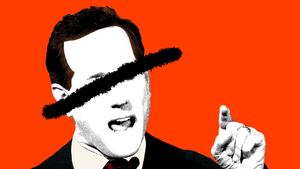Meghan McCain is making waves this week for describing her former job at ABC’s The View as a “toxic work environment.”
I suspect many Americans may think that McCain is crazy to walk away from a dream job that pays millions of dollars to be on TV a few hours a week. These folks may see her decision as evidence she’s spoiled and privileged. Others might think she’s fragile or weak for quitting.
As a fellow conservative who has (all too often) been outnumbered on TV, I can understand why she walked away—and I suspect she made the best decision for her mental and physical health and her young family (in her new book, Bad Republican, McCain says that part of the story involves postpartum anxiety, but she also recounts hurtful experiences with co-hosts such as Joy Behar and Whoopi Goldberg). Although I don’t pretend to know what her life at The View was like, I suspect my own experiences have, to some degree, informed my opinion.
First, though, it’s worth discussing the merit of being a token conservative. If your role is solely to play the “heel”—a villainous patsy who’s paid to lose—it’s not worth the money. But if you’re there to push back on group-think and provide philosophical diversity, as McCain often did, this role can be incredibly valuable and mutually beneficial.
Still, this role has gotten increasingly fraught as “mainstream” networks have shifted to a fan-service model. If you are a conservative on a liberal TV network, you will almost always be outnumbered; the host and his or her producers—who dominate the show and the topic selection—will also not share your politics. As McCain told Vanity Fair of her experience on The View, “It was much harder to get [topics she wanted to discuss] on-air because all the producers are liberal, all the [other] hosts are liberal. The excuse is more people picked that topic. Of course! I’m outnumbered.”
What is worse, expressing even a mainstream conservative viewpoint these days is generally interpreted as a serious character flaw. After all, if you don’t support progressive policies across the board (whatever they may be), it can’t simply be because you have a different philosophy. You are assumed to be a hate-monger, a generally bad person.
Multiple times over the years on various mainstream cable outlets I came away from a TV hit feeling beaten down and shamed because of my worldview. One time, after suggesting that a lot of men are still grappling with understanding what the new #MeToo rules are (think Aziz Ansari or Al Franken), liberal panelists acted like I was a potential predator who had just defended Harvey Weinstein. Another time, during what felt like the zillionth segment about the 2017 Women’s March, I suggested that young working-class men are arguably facing greater challenges than women. I noted that they are being left behind by women who attain higher education levels and are increasingly deemed “unmarriageable.” Instead of being applauded for offering a counterintuitive insight, this assertion was mocked and dismissed by the host.
On another occasion, I got into two fights with two different hosts on the same day because I dared to refer to the protesters who chased Ted Cruz and his wife out of a DC restaurant as a “mob.” The second time, things got so heated that CNN’s Don Lemon, whom I generally got along well with, told me to “shut up.” This was sort of like Whoopi Goldberg telling McCain, “Girl, please stop talking!” except, unlike McCain, I was not a co-host.
What I experienced was par for the course (politics ain’t beanbag), though still frustrating on a day-to-day basis. Others have suffered far worse. I recall one occasion a few years ago, when I was on set with a bunch of panelists, including a full-fledged pro-MAGA pundit. During our segment, one of his female interlocutors feigned filing her nails on the split screen as he talked. Things were even worse when the camera went off, when not one but two of his female counterparts took turns berating him. He tried to patch things up and extricate himself, but they wouldn’t permit him to squirm away. I went to the bathroom, only to find one of the other panelists, a prominent liberal commentator, lingering there. As I approached the urinal, he explained to me he wasn’t there to go: “I’m just hiding.”
People think TV is glamorous—and it can be—but, for the conservative commentator (who isn’t on Fox News), it sometimes feels more like a lonely, pride-swallowing, and soul-crushing experience. This became even truer in the Trump era—despite the fact that neither McCain nor I are fans of the former guy. That’s why I don’t blame McCain for feeling perpetually sad and humiliated—or for walking away from what sounds like a dramatically worse environment than the one to which I happily subjected myself.
If your everyday work life entails being outnumbered, roughed up, and told your views are crazy or dangerous (it doesn’t matter how irenic you are) it is, over time, incredibly demoralizing and exhausting. It will affect the way you view yourself. It will undermine your confidence, which is the one thing you need most in the superficial business of being on screen.
People want to get on TV so they can feel awesome, not so they can be villainized. If you had enough money, fame, and stature to walk away from that environment, why wouldn’t you? McCain would have to be a masochist to stay.



